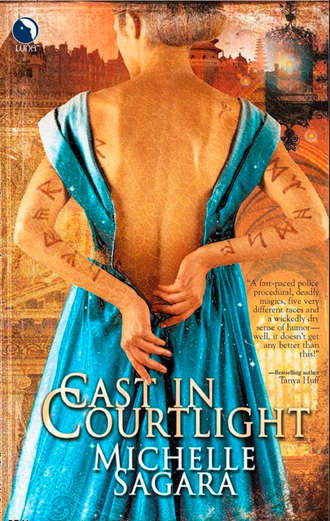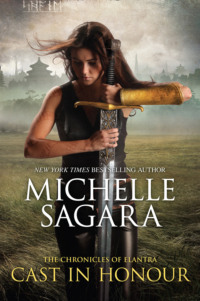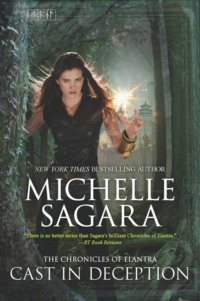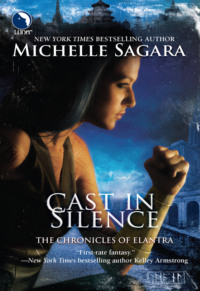
Полная версия
Cast In Courtlight
She’d stolen their inkwells in response. Except for Garrity’s; him, she’d left invisible ink.
But it had taught her something. The Law? It existed for a reason. The reason being that people weren’t basically as honest as she’d dreamed they would be, when they had the choice.
At home, she’d had no choice: steal or starve. Here, they had a choice. But it was steal or be left behind. Words failed her when she tried to put her contempt for this into them; she often hit people instead. Or tried.
This is when she discovered that Law applied to the officers of said Law. All in all, a discovery she could have done without.
She wondered, not for the first time, what Severn’s life with the Wolves had been like. He wouldn’t talk about it. And that was probably a good thing, if he wanted to keep on breathing. He’d spent time in the Shadows, and the Shadows were unkind; they were the darkest face the Law could turn on the populace. People whispered about Shadow Wolves when they’d had too much to drink. Some even said there were arcane arts that turned good men—well, okay, bad men—into things that weren’t men anymore.
But she’d seen Severn, and she knew that he was more or less exactly what he had been when he’d taken her under his wing after her mother’s death. She’d been five. He was ten. She’d thought she understood him, then—but what had she understood?
That he would die to protect her.
She could live with that.
That he would kill to protect her.
Hating the direction of her thoughts, she turned them aside; she’d become good at that, over the years.
It wasn’t close to dark, yet; the sun was edging across the river, and reflected light turned parts of the slow-moving water a shade of pink that would have been an embarrassment to the man the river had been named after. She paused on the banks, looking up and down their length for as far as the eye—and hers was keen—could see. The riverbanks were where many petty criminals gathered to exchange gold for a moment’s illegal escape from pathos; it was easy to dump evidence, and the river would carry it away before it could be gathered and used in the courts.
Of course, some officers forgot the Laws that applied to Officers of the Law at that point; they called it self-defense. Had any of the injured dealers ever lodged a complaint, Teela and Tain would have been permanent fixtures on the inside of the small prison that sheltered behind the Halls. But oddly enough, there seemed to be a game in this, and you lost if you complained.
Everyone knew, after all, that the Barrani had only been part of the Law for some two decades—the whole of Kaylin’s life. And they had memories that lasted a lot longer.
There were no deals going down.
Even the petty criminals seemed to have decided their stash was better sold on the streets that the Festival occupied. And the streets? Once the carters had got in and done their work, they were almost impassable. You couldn’t walk a foot without someone trying to sell you something, usually at a three hundred percent markup over what it would cost at any other time of year.
She found herself at the foot of the bridge. It was, by foreign accounts, a perfectly normal, if somewhat unimpressive, bridge; you could take a horse across it, and you could certainly march a contingent of men that way—but a wagon was almost impossible, unless the driver was unnaturally gifted and the horses under perfect control. Perfect.
She didn’t much like riding. She stood there, and then leaned over the nearest rail, watching the water pass under her feet. Here, on the boundary of her old life, she let the day unwind. The night was cool, for a Festival night; the air was clear. She wondered, sourly, if the Arcanum was controlling the weather; it was unseasonal. It would also be illegal.
Technically. In this city, even on this side of the banks, power was the order of the day; if you had it, the Law was a petty inconvenience. As long as no one was killed, or more likely, you were very, very good at disposing of the bodies.
Her cheek was throbbing dully; she lifted a hand almost absently to touch the flower placed there by the magic that she most hated. Well, second most. The magic that she most hated was engraved on her arms, her legs, the back, now, of her neck.
But it had been quiet. If it weren’t for the arrogance of the Imperial mages, she would have had nothing to complain about, and this was unnatural. Complaining, according to Garrity, was the gods-given right of people who were Doing Something Useful; it was a little luxury. When, you know, duty forbade larger luxuries, like drinking.
And she wasn’t Doing Something Useful, as Garrity would put it. The Festival season had been expressly forbidden her; she was surprised that they hadn’t sent her out of town on the first coach.
Her cheek was actively painful, now. She touched it, wondering if it was swollen; if the lines engraved there were like the lines of a burn, and had taken some sort of stupid infection. Her skin was cool to the touch, her palm a little too dry.
She let her hand fall, casually, to her side. It was the side at which her daggers were neatly arranged.
Straightening slightly, she turned.
A man was standing at the foot of the far end of the bridge, except that he wasn’t. A man, that is.
Surprise robbed her of words for a moment, but it added the hilt of a dagger, and the rest of the blade followed as she drew it. A warning, really. Or perhaps a gesture of greeting; it certainly wouldn’t do her much good in a fight.
He was Barrani.
She wasn’t. The odds favored him.
Even had she been Barrani, the odds would still favor him. He was, after all, Lord Nightshade, the crime lord under whose sway the fief of Nightshade prospered.
“It is sunset,” Lord Nightshade said as he stepped onto the bridge. The wooden planks didn’t even register his weight. Which, given the age of the bridge, said more about his movement than it did about the planks.
“Almost.” She managed to shrug.
“You shouldn’t be out in the streets, Kaylin. I was, I believe, most explicit about that.”
She shrugged again before his words really registered. Sometimes nerves made her quick; sometimes they slowed her down. Quick was preferable. “Explicit to who?”
He raised a perfect, dark brow. It was perfect because he was Barrani. In fact, his eyes, which were a deep, startling green, were also perfect, and framed by—yes—perfect lashes. His face was the long, fine face of Barrani everywhere, his hair, the long perfect raven-wing black. He moved like a dancer. Or a hunting feral.
But he wore clothing—a long, dark cape over a robe that was both fine and edged with gold. Nothing about Barrani dress was ever less than ostentatious, even when it happened to be the same uniform—sized up—that she herself was now wearing.
She hated that. Anyone sane did.
Well, all right, anyone sane who wasn’t also immortal and perfect and didn’t take unearthly beauty for granted. “Why are you here?”
“Because you are,” he replied. “You’ve been calling me for the last week.”
She frowned. “I haven’t.”
His shrug was elegant; it made hers look grubby. And unlike Teela or Tain, he didn’t even make an effort; he spoke Barrani, and at that, the High Caste Barrani she most despised. Teela spoke Elantran when she was with the Hawks. Even when they were Barrani. When Teela broke into Barrani of any flavor, it meant trouble. “As you like,” he said quietly.
He drew closer, but stopped about two feet away. He did not, however, lean against the railing.
“You’re almost on my turf,” she said quietly.
“Almost is a mortal word.” He gazed at the river, and gestured; it seemed to freeze in its bed, like sleek glass. She could see herself clearly in the momentary reflection; she could see him more clearly, and in the end, it was the fieflord she looked at. Who wouldn’t?
“You have not come to visit,” he said quietly.
She started to reply, and caught the words before they left her mouth, for perhaps the first time today. The fieflord was not known for his sense of humor. Or perhaps he was: He regularly killed people who offended by implying it existed at all.
Bravery was costly in the fiefs. Defiance was more painful, but not ultimately more costly.
“No,” she said when she could talk. “I haven’t.”
Before she could move, he reached out to touch her cheek, his fingers caressing the skin that bore his mark. He did not touch any other part of her face, but he didn’t have to—his meaning, in the gesture, was plain.
“You could remove it,” she told him softly.
“Yes, I could. But not without cost.” His smile was unsettling. “You speak my name when you sleep,” he said softly. “My true name. And there is no way to avoid hearing it—not for me.”
“I can’t speak it,” she said, something like fear informing the words.
“I know. I believe you did try when Tiamaris asked.” “I tried. Once.” “What did he hear?” “Nothing.”
“But I heard it,” he said softly. “You were in Castle Nightshade.”
His brow rose. “Yes,” he said, and it seemed there was caution in the affirmation. “I was.”
“Why did you—why are you here?”
His eyes shifted in color. It was sudden, but it was entirely unexpected; nothing Barrani did could be expected, almost by definition. You just couldn’t trust them, and predictability implied a certain belief in routine. “The castelord has called the High Court,” he said quietly. The wrong type of quiet.
“I … know.”
“Anteela will be there.”
“An—oh. Teela.” She remembered that Lord Evarrim had called Teela that, what seemed like another lifetime ago. “She’s gone. But none of the other Barrani are.”
“They wouldn’t be. None of the other Barrani, as you so casually put it, withdrew from the Lord’s Court to pursue the idle life of a … Hawk.”
“She’s a—”
“In Elantran, you would call her Lady Anteela,” he said, using the word Lady with some distaste. “If she desired it. She does not.”
“So she left.”
His smile was cold. “The Hawks are trained to observe, are they not?” “They are.”
“Then the training given is poor indeed.” “We like to observe fact.”
“Fact, as you so quaintly put it, is something that is rarely understood if it is observed with no understanding of context. She withdrew from Court. Her absence was noted. It was not, however, appreciated.”
She didn’t ask him how he knew.
“Wise,” he told her. “Understand, Kaylin Neya, that you will be at the heart of many discussions when the Court convenes.”
“And that will be?”
“When the moon is full,” he replied. “And silver.”
“Which moon?”
“There is only one that counts.”
She didn’t ask. As far as she was concerned, there were two. “Why are you here?” she said again.
“I am unwilling to risk you in the games that will no doubt unfold. You are too ignorant of our customs.”
“You’re outcaste,” she said without thinking. “They’re not your customs anymore.” She caught up with her flapping mouth and shut it hard enough to hear—and feel—her teeth snap.
His eyes were now a blue that was sapphire. Midnight sapphire. “Come,” he said, and he began to walk away, down the gentle slope of the bridge.
On the wrong side.
“You can’t—you can’t go there!”
“While it is true that I seldom venture outside of my domain, I am seldom stopped when I do so.”
He continued to walk, and after a moment, she pushed herself back from the comfort of bridge rails and leaped after him. His stride was a good deal longer than hers, and she had to work just that little bit harder to keep up; it was hard to look cool and composed when one was breathing too hard.
She followed him, looking back and to her side in growing unease. No one seemed to notice that the damn fieflord of Nightshade was walking the streets of Elantra. Then again, she wouldn’t have believed it either; she would have seen just another Barrani, in the company of a junior Hawk.
But as she followed him, the streets grew familiar. Not even the gaudy ribbons and wreaths, the symbols of a dozen different gods, the statues—layers of new paint over layers of old paint, like some miniature ode to geological formations—could make these streets so new or strange that she wouldn’t recognize them; if she closed her eyes and slowed down, her feet would know the path.
He was walking her home.
She stopped walking, in the vague hope that he would. Instead, the distance between them grew until she’d have to really sprint to close it. She did.
She couldn’t bring herself to touch him; had he been Severn, she’d have had two handfuls of elbow as she swung him around. Instead, she tried hard to avoid looking at any of the details of her daily life that made her life bearable. As if, by ignoring them, she could protect them. She walked.
He stopped in front of her building, at the locked door. She fumbled for her keys, but because it was deliberate, a way of buying time, he taught her a small lesson; he passed his hand over the lock, and she felt her cheek flush. Just the one.
The door opened, gliding with a creak on its hinges.
He didn’t speak a word; he simply met her gaze and waited. This much, that gaze seemed to say, he was willing to grant her for the sake of her dignity. But it was his to grant, and his to deny.
“I should arrest you,” she muttered as she hurried in the door. It closed behind them.
His smile never reached his eyes. “I think that not even your Sergeant would demand that you carry out that duty. You are, of course, free to try.”
She walked past him and up the narrow flight of stairs, stopping at the bend. He followed, and again, he followed in such a way that the stairs didn’t acknowledge his weight.
Not even Teela could do that.
“She can,” he said.
“Will you stop?”
“No. If you wish to shield your thoughts, it is something you will have to learn. And I fear that your ability to learn this simple act is hampered by your inability to learn what is not taught by fists, knives, and the streets.”
She knew he was referring to the mages. She almost accused him of spying—but what would be the point?
“Very little.”
And she wanted to hit him. She unlocked her door instead.
Her room, as usual, was a mess. It had been a bright and tidy place while she’d been recovering from her fight with a gods-cursed Dragon, but that had been Caitlin’s doing, and once Caitlin had no longer judged herself necessary, it had reverted over the course of a few busy—and, yes, late—days into the place that she called home. Piles of laundry were the only works of art along the floor; her shutters were closed, and tied with a small length of chain, and her mirror was covered.
Her bed was unmade, of course. Everything seemed to be. Even the chair looked untidy, which was odd, as chairs didn’t normally require much making once they’d left the carpenter.
She headed toward the kitchen, and Lord Nightshade raised a hand. She felt it; her back was turned, so she couldn’t see it.
“You are here,” he told her quietly, “to gather the belongings you feel are necessary for your comfort.”
“What?”
“I have no intention of leaving you in this part of the city for this particular Festival.” “What?” She felt like a parrot.
“Rooms have been prepared for your use in Castle Nightshade. You will remain there until the Court has adjourned.” “But I—I have to—work—”
His response was a silence that was all blue. “Understand, Kaylin, that this was not a request.” “And if I don’t want to go?”
“You don’t,” he replied with a Barrani shrug. “What of it?”
The dagger that she’d forgotten to sheathe looked pathetic in the scant light. She stared at it for a moment, and then looked at the fieflord. Here.
She was cold.
After a moment, she started to gather her clothing, her weapons, the sticks she shoved into her hair. She shoved these into a sack.
“You will be free to return—if you desire it—when things are less … difficult.”
CHAPTER 3
Inasmuch as Kaylin understood class—the adult form of bullying and condescension—she felt like a class traitor. Lord Nightshade was rumored to be a mage of great power, and in spite of the fact that she’d evidence of that with her own eyes—and Hawks had their own arrogance when it came to trusting opinions formed by gathering information—she was almost disappointed when they walked down the same set of narrow, shoddy stairs and into the wide streets. She had expected something less mundane.
Hell, she’d once seen him walk through a mirror and vanish. Then again, her mirror would bisect him, so it was probably just as well.
Her bag hung over her shoulder, and her uniform gathered in uncomfortable, trapped wrinkles; she felt like a street urchin again. Especially when compared with her companion. She took care not to make the comparison more than once.
He led the way, and she followed; she would have led, but his stride was the longer of the two, and his dignity—Barrani dignity—did not allow him to trail behind something as lowly as Kaylin. It did, however, allow him to stand behind his chosen guard when he chose to venture into the streets of the fief he ruled.
He’d brought no such guard with him.
When they reached the bridge, she paused. He had walked ahead, and he, too, paused at the gentle height of the bridge’s curve. He turned to watch her. Met her eyes.
“I assure you,” he said in a tone of voice that had the opposite effect, “you are not a prisoner. This is not a kidnapping. I do not intend to … interfere … with your duties in the Halls. I merely wish to insure that no one else has the opportunity to interfere with them.”
“I’ll have to tell—”
He grimaced. “If it comforts you, I have altered your mirror. If someone chooses to invoke it, it will carry your message to your room within the Castle.”
“Where you’ll hear everything that’s said.”
He raised a brow.
“The Hawklord isn’t going to be happy about this.”
“The Hawklord is not your lord. He rules your life when you labor under his command. What you do in your … free time is not his concern. Come, Kaylin. It will be dark soon, and while I am not afraid of ferals, I do not think facing them will be in your best interest.”
Enough of a warning. She made her way across the bridge, marking the point at which her new life was discarded and her old life opened up before her in the roads and causeways of Nightshade.
It was not the only fief she knew; not even the only fief she had called home. But it was the fief in which she had lived almost all of her life. The other, she didn’t name and didn’t think about.
“Why is the Barrani castelord—”
He held up a hand. “Now is not the time for that discussion.” His smile was slender and cool. “If we are lucky, there will be no time for it. If we are not, you will have answers. The castelord of the Barrani is a subtle lord, and he has governed for centuries. He has not, of course, been uncontested.”
She didn’t ask what happened to the challengers; she assumed they were dead. And if they were, no complaint had been made to the Emperor or the Halls of Law, and no investigations—that she was aware of—had been started. Then again, if there had been, she probably wouldn’t be aware of them; Barrani weren’t as interesting, in terms of criminal activity, as the rest of the mortal races, and if she’d been forced to learn their language, she’d never much cared to learn their history, even as it pertained to the Halls of Law.
Barrani were unpleasantly cold, but they kept to themselves, and while they valued power, they were one of the few races she could think of that didn’t equate said power with money.
Money made people stupid.
Or starvation did. She’d never heard of a starving Barrani before.
“Severn won’t like it,” she said without thinking.
“No. But I assure you, Kaylin, that he will like even less the possible outcome of an entanglement with the Barrani lords. He did not,” he added without a shift in expression, “appreciate the fact that you would be living alone in an indefensible hovel while the Court convened.”
“Is there anything about my life you don’t know?”
“Very little,” he replied smoothly. “You bear my mark, little one. You hold my name. Did you think that these were merely decorations or human familiarities?” “No. But I was trying.”
“Expend your efforts, then, on something worthwhile. We have fought the outcaste Dragon,” he added, “and we have killed the dead. There is always a cost.”
Yes, she thought bitterly. Always. And we’re not the ones to pay it.
“A lesson, for those who want power.” She wondered why anyone did.
“Because if you have power, you make the decisions, Kaylin.” “You have,” she said, the words an accusation. “And what decisions do you make that make power attractive?” “Ah. I am not one of the dead.”
Which wasn’t very helpful. The streets narrowed as they walked them; they were almost empty. The tavern owners and the butchers and the grocers who were chained to this side of the river were busy pulling in the boards and wheeled carts they used for display. If they noticed the Barrani lord, they gave no sign; at night, the ferals were more of a threat.
And night was coming.
She followed Nightshade, her cheek tingling. She wanted to brush it clear of the odd sensation, but she’d tried that many times, and all it did was make her hand numb. But she hesitated as the Castle came into view.
“There are no bodies in the cages,” he said quietly.
She looked up to examine his profile; he hadn’t turned to speak. “I guess people are busy preparing for the Festival.” It sounded lame, even to her.
“Too busy to offer offense?” His smile was sharp, but again, she saw it in perfect profile. “No, Kaylin Neya, it is a gift. For you.”
“You knew I would be coming here.”
“Yes. And I do not intend—at this time—to make your stay more difficult than it must be.”
There were two guards at the black facade of the gate. They offered Nightshade a deep obeisance, a formal and graceful bend that did not deprive them of weapons or footing. He did not appear to notice.
But they offered no less respect to Kaylin. It made her uncomfortable; it put her off her stride.
“They are here for protection,” he told her as he made his way to the portcullis. “And I am seldom in need of protection here.”
She hesitated, hating the portcullis. It never actually rose; it was a decorative set of heavy, black iron bars that should have been functional. She’d seen them before a dozen times in other buildings, and had learned to listen to the grinding of the gears that raised them.
But these? They weren’t. Raised.
You didn’t enter Castle Nightshade without an invitation, and when you did—you walked through the lowered portcullis; it was a very mundane depiction of a magic portal. And it took you somewhere else. She wondered if the courtyard that could easily be seen through the spaces in the bars was real, or if it was a backdrop, some sort of tiresome illusion.
She really, really hated magic.
“Kaylin?” Lord Nightshade said. It sounded like a question. It was, of course, a command. He held out a hand to punctuate the fact, and she forced herself to move slowly enough that it didn’t seem like an obvious hesitation. Given that she wasn’t her audience, she couldn’t tell whether or not the watching Barrani guards could tell the difference. She doubted they cared.
But they were … different.
“Of course,” Lord Nightshade said in a voice that barely traveled to her ears. “They know what you fought, Kaylin. They know you survived. They could not, with certainty, say the same of themselves in a like situation.”








